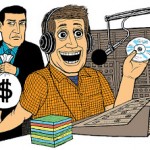Payola is a big no-no in the music business, and yet it is a persistent problem. Payola is the word used to describe the act of a record label or other interested party paying a radio station to play a certain artist (either in cash or in goods). The practice has obvious implications: when money changes hands in exchange for radio play, certain artists get more exposure than others. Exposure is key to making it big in the music business, and in an ideal world, the public’s response to artists and songs should drive who receives the bulk of the media exposure. When payola enters the picture, the record label is deciding which artists will fail and which will succeed. In other words, the playing field is no longer level.
A payola scandal turned the world of rock radio on its head in 1959, taking down one of the eras most beloved DJs, Alan Freed, and almost costing Dick Clark his career. Since then, the music industry has made an effort to crack down on payola, but the practice persists.
Past Examples
The issue of payola reared its head again, when, in 2005, Sony BMG, one of the world’s largest record labels, was forced to pay out $10 million in fines after the state of New York found the company guilty of engaging in payola. The cases says several labels within the Sony company rewarded DJs with cash and goods for playing Sony artists, with the majority of the charges involving plays of the latest Jessica Simpson album. The label went to gerat lengths to hide their practice – in some cases, they ran fake promotional competitions and gave all the prizes to DJs. This scandal is one of the largest payola scandals in recent years.
In 2006, the Federal Communications Commission (FCC), who oversees radio in the US, announced it was launching an investigation into payola practices of hundreds of US radio stations.
Background
Payola, which is sometimes also referred to as “pay for play”, is as old as commercial radio, but it really took off in earnest with the advent of rock music and profitable rock music radio. The act itself is not illegal in the US, as long as the radio station excepting money for the song discloses that fact to listeners. Several songs have been recorded that parody payola practices, including:
-Hey Mr. DJ, I Thought You Said We Had A Deal – by They Might Be Giants
-Pull My Strings – by The Dead Kennedys
The topic of “pay to play” live performances often enters the discussion when talking about payola. Pay to performances are when a band pays a promoter for a chance to play a show. The practice is not illegal, but is highly criticized and definitely inadvisable for
Pros
Are there any pros to payola? Unless you are the artist whose career gets a boost, or the label who sees increased sales, not really. Unfortunately, since exposure is 99% of the battle in the business, payola CAN pay off for these people.
Cons
Payola hurts almost everyone. Some of the cons to the practice of payola are:
-The public does not get to hear artists whose labels can’t afford to pay off the DJ, or whose label refuses to engage in the practice.
-Artists whose albums come out at the same time as another artist whose label is engaging in payola may see dismal sales because of a lack of exposure – leading to tour cancellations and being dropped by their label. It is especially damaging to independent artists and small labels.
-It hurts the integrety of the music business and everyone involved in it.
-It pushes up the cost of music, since labels involved in payola need the money in their budget to pay the DJs
-It’s bad for radio, because it makes radio homogenous. People turn off when the same old song is on every station. It also hurts the radio stations who refuse to accept bribes for plays, as the other stations get cash injections from the labels.
Where It Stands
As it stands today, payola remains illegal, and yet widespread. Unfortunately, when the people involved get away with it, it works. The Sony BMG case shined a fresh light on the issue, however, and a crackdown is in the works.







